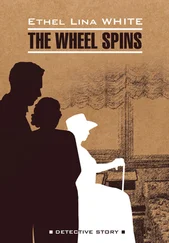"Going to marry him?"
Joan was conscious of a slight recoil, so that she had to remind herself of her former standard of modern frankness.
"If he doesn't break away, I may," she replied. "After all, I've had to submit meekly to employers all my life, and I'd like to do some bossing myself, for a change. Purely, can't you see me telling the cottagers to boil their potatoes in their skins, and not to have any more babies?"
"I'd believe anything of you, Brook," remarked her friend. "By the way, what's your Lady d'Arcy like?"
"Big and vague, and drifts about aimlessly. I've nothing to do but to act as some sort of anchor. I get a big salary which I can't spend here. But it's not wasted at home. They're nearly sunk, bless 'em."
The novelist's face was not painted to be revealing, but she nodded to show her sympathy with the prevailing economic depression as she studied Joan through her monocle. The girl was tall and strong, with a face expressive of character, and fearless eyes. She wore a sleeveless white tennis-frock and silver slave-bangles on her brown arms. Although she had grown more solid, she seemed to be of compact virtues and charm.
"Well? The verdict?" asked Joan.
"Guilty!" replied her friend. "You're a last year's model. You've put on weight. Your lips look indecently like lips. And—darling, I'm jealous as hell."
"I know I wouldn't swap jobs with you." Joan gave a contented laugh. "This is really a marvellous place, Purley. Everyone has a pedigree and a private income. Everyone's kind. And, my dear, everyone's married."
"I get it. No love-babies, no drains. Gosh, what a picture!" As the two women emerged from the gloom of the avenue they saw the village with its ancient cottages and choked flower-gardens, all steeped in the carnation glow of sunset. At each step they seemed to turn a fresh page of a fairy-tale, with illuminated borders jumbled with box-edging, sage, damson-trees, beehives and a patchwork quilt of peonies, pinks and pansies. Golden girls and boys skipped in the street, while cats were growing mysterious as they awaited the herald—twilight. Soon their real life would begin.
The novelist surrendered herself to the enchantment, although her lip curled at evidence of the survival of the Feudal System, for all the children bobbed to the 'quality'.
As they lingered on the green, Joan pointed to a solid house of buff stucco, adorned with a clock-tower.
"That's 'Clock House'," she said. "The Scudamores live there. I hope we'll meet them, for they're types. They're terribly nice and terribly happily-married. I call them 'The Spirit of the Village'. You'd find them 'Copy'."
The novelist stifled her groan, as Joan proceeded to do the honours of the village. She waved her cigarette towards a grey stone house which was backed by the Norman church.
"The Rectory. My future home." She forced the note of impudence. "Just behind us is the doctor's house, but the walls hide it. It's Queen Anne and rather sweet. He and his wife always play tennis after dinner. You can hear them."
As they stood, listening, the dull thuds behind the rose-red bricks mingled with the faint laughter of children and the cawing of rooks in the elms. Suddenly, the novelist fell prostrate before the cumulative spell of the village.
"It's perfect," she declared. "I wonder if I could rent a cottage for the summer."
"If you did you'd never go back to London," Joan told her. "Nobody ever goes away, not even for holidays. Look out. Here are the Scudamores."
She guiltily hid her cigarette behind her back, as a middle-aged couple advanced, arm-in-arm, over the cobbles. The man had a clean-shaven, long-lipped, legal face, to proclaim him a lawyer with the best County connection, together with a nose which had been in his family for centuries.
His wife was also tall, and possessed of bleached beauty and elegance. Her luxuriant fair hair was fast fading to grey, and her draperies were indefinitely grey-green in colour, like a glacier-fed river.
She greeted Lady d'Arcy's companion with a gracious bow, but did not even glance at her companion.
"She didn't really like me," murmured the novelist when the Scudamores had passed. "Do I look like a fallen woman? Tell her I'm respectable, if painted."
"My dear," gurgled Joan, "she's so charitable that she would not take a chance of disliking you. That's why she wouldn't look. She's a bit overwhelming, but a real Christian...I say, Purley."
As Joan paused and regarded her friend intently, the novelist braced herself to meet the inevitable question.
"Can't you make a story out of this village?"
"You would say that." The novelist's tone was acid. "But, my good woman, what possible copy could I find here? Jane Austen's beaten me to Cranford . The truth is, my child, if there'd been no Fall, there'd be no Publishers and no Lending Libraries."
"But there must be a story everywhere," persisted Joan.
"Not for me."
"Oh, come, Purley, have a shot at it. I want to be amused."
The novelist puckered up her painted lips in a whimsical smile.
"All right," she conceded. "But I'll have to follow my own special line. Something like this. This village seems an earthly paradise, with a population of kindly gracious souls. But the flowers are growing on slime. When twilight falls, they light their lamps and draw down their blinds. And then—when no one can see them they lead their real lives."
"For example?" urged Joan.
"Well, to begin with, that highly-respectable married couple, who disapproved of my lips, are not really married to each other, but are living in sin."
"You priceless chump. Tell me the story of their double life."
"No, I must outline my synopsis first and collect my characters...Hum. The Parsonage is hidden by those discreet yews, so the Rector hasn't got to wait until dark. I think, at this moment, he's throwing a bottle-and-pyjama party with some very hot ladies from town. As for your doctor, he's slowly poisoning his wife, and their tennis is his opportunity. When they've finished their game, she'll be thirsty, and her devoted husband will see to it that she gets the right quencher. Something safe, and very painful."
"Ugh," grimaced Joan. "When I'm Mrs. Padre, I'll ban your novels in our village library."
Once again she was urged to speak recklessly of her designs on the Rector, from a clouded feeling that she was protecting herself from the unforgivable charge of sentiment. Lighting another cigarette, she strolled after her friend, who was peering through the scrolls of lacey iron-work which ornamented the gates of 'The Spout'.
In the distance, against a background of laurels, the novelist saw an austere, silver-haired woman, seated on a bench beside a lily-pond. Her hands were clasped and her eyes raised as though in meditation. She held her pose so rigidly that the folds of her white gown appeared to be carven marble, creating the illusion of an enshrined saint.
But even as the novelist readjusted her monocle, the statue dissolved into life at a touch of warm humanity. Down the yew alley, pottered a little dumpy woman, carrying a glass of milk on a tray. The tall lady patted her shoulders, in thanks, and then drained the glass hastily, as though in obedience to the laws of nutrition, but with a supreme contempt for digestion.
When she walked towards the house, followed by her companion, the difference in their heights was ludicrous, for she was above the usual stature, while her employee was below the average.
"Miss Asprey and her companion, Miss Mack," whispered Joan. "She's an earthly saint, and so good she's not quite human. Miss Mack simply worships her, and runs after her like a little dog."
"Then they shall go into my serial," announced the novelist. "Listen. In reality, your pure, saintly Miss Asprey is a secret sadist. Directly the blinds are drawn, she will begin to torture her poor little companion."
Читать дальше












